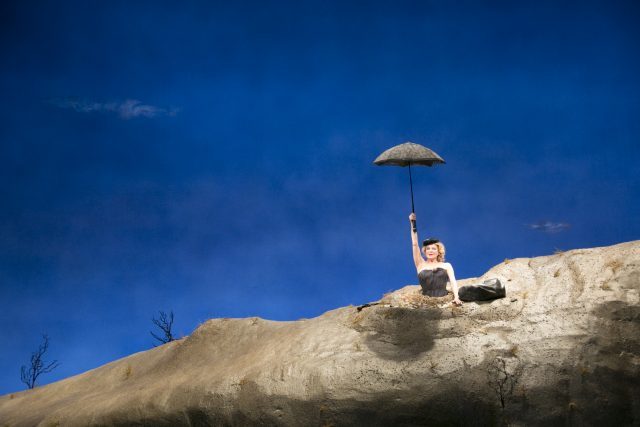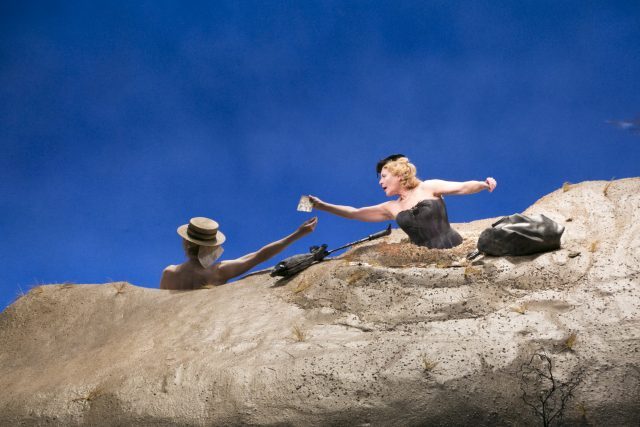
Dianne Wiest stars as Winnie in Yale Rep production of Happy Days at TFANA (photo by Gerry Goodstein)
Theatre for a New Audience, Polonsky Shakespeare Center
262 Ashland Pl. between Lafayette Ave. & Fulton St.
Tuesday – Sunday through May 28, $85-$120
866-811-4111
www.tfana.org
In preparing to play Winnie in Samuel Beckett’s Happy Days, a part she had been waiting thirty years to take on and one she calls “the Hamlet for actresses,” Dianne Wiest worked with a special movement coach in order to deal with the role’s unusual physical demands: She must spend nearly two hours buried in an artificial sand dune, in the first act only able to move her upper body and in the second act even less. Unfortunately, perhaps that’s why the two-time Tony and Emmy winner’s performance can feel overly mannered in the first half of the show, which continues at Theatre for a New Audience’s Polonsky Shakespeare Center through May 28, although she dazzles after intermission. Winnie is first seen in a strapless black dress, her torso and head the only parts of her body sticking out from atop Izmir Ickbal’s large sand dune, behind which is a trompe l’oeil backdrop of white clouds and blue sky. A mysterious bell rings her awake, and Winnie begins her morning ablutions, going through her bag, taking her medicine, brushing her teeth, and getting ready for the day, which pretty much is going to be like every other day in her life, but she is cheery and chipper nonetheless. “Another heavenly day,” she announces with a smile. “So much to be thankful for — no pain — hardly any,” she adds, shining with positivity. To her right, in a crevice, is her husband, Willie (Jarlath Conroy), who is rarely seen and has very little to say aside from reading obituaries and job postings in the paper. Wiest overemotes with her bare arms, drawing too much attention to them, detracting from Winnie’s charmingly abstruse existential ramblings. Every movement, every pause, every emotion was written into the script by Beckett, but here they are just too broad.

Willie (Jarlath Conroy) and Winnie (Dianne Wiest) face life and death in Samuel Beckett revival (photo by Gerry Goodstein)
In the second act, with her arms buried beneath the sand, Wiest (All My Sons, Hannah and Her Sisters) really hits her stride, her high-pitched, singsong voice rising throughout the theater with the dawn of a new day. “Hail, holy light,” she begins. “Someone is looking at me still. Caring for me still. That is what I find so wonderful. Eyes on my eyes,” she says, referring to the rapt audience. “What is that unforgettable line?” We are looking at her indeed; of course, it’s a play in which you have to keep your eyes on her, but you’ll be mesmerized by Wiest’s tantalizing performance in this second half. However, director James Bundy never quite establishes a connection between Winnie and Willie, who is relegated to merely an afterthought. In the 2015 Boston Court production at the Flea, starring real-life husband-and-wife Brooke Adams and Tony Shalhoub, Willie was much more critical to the narrative, which also took on climate change. But Bundy, Conroy, and Wiest still do justice to Beckett’s views on the passage of time, with intriguing references to sex, death, and vaudeville and Winnie regularly championing “the Old Style.”